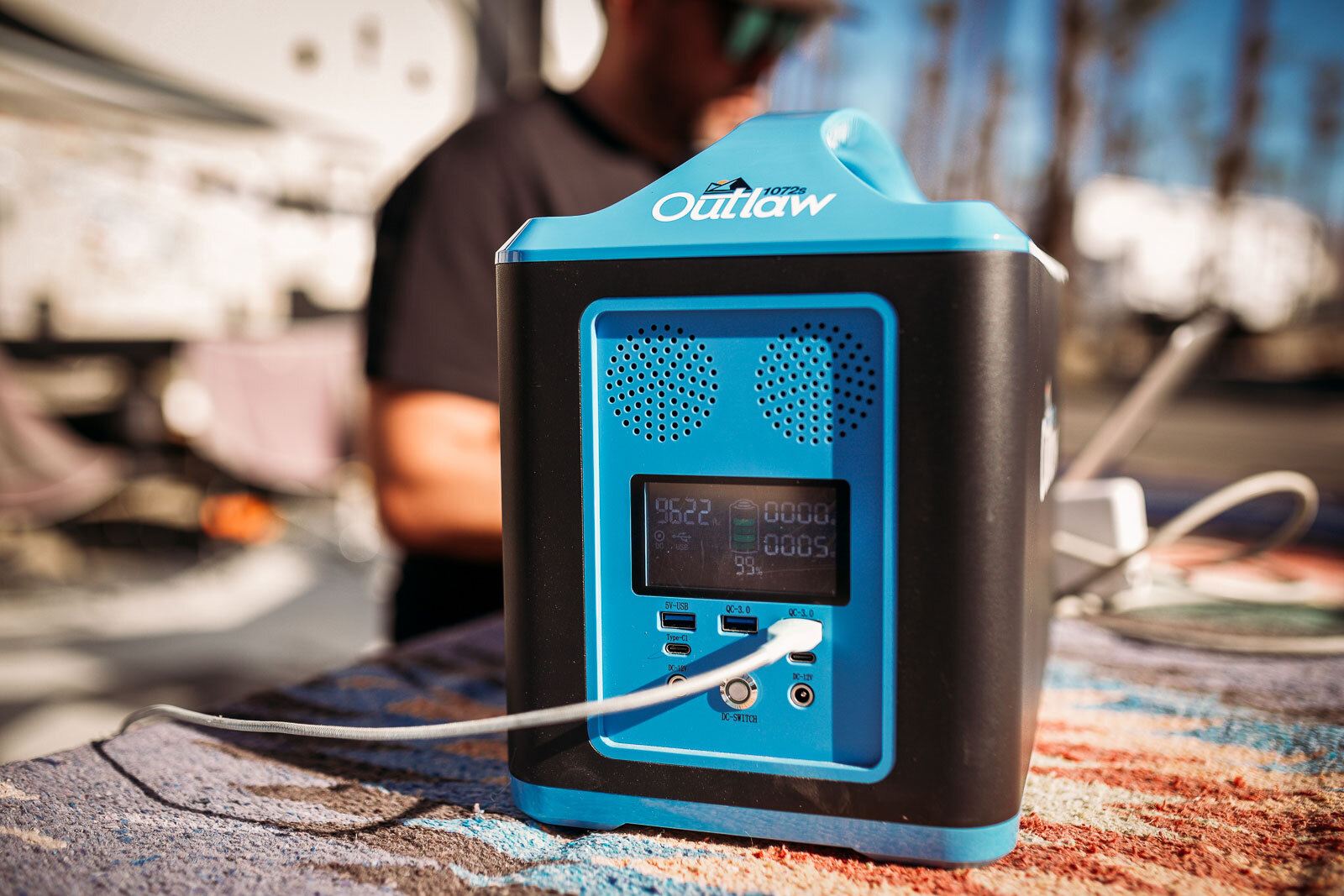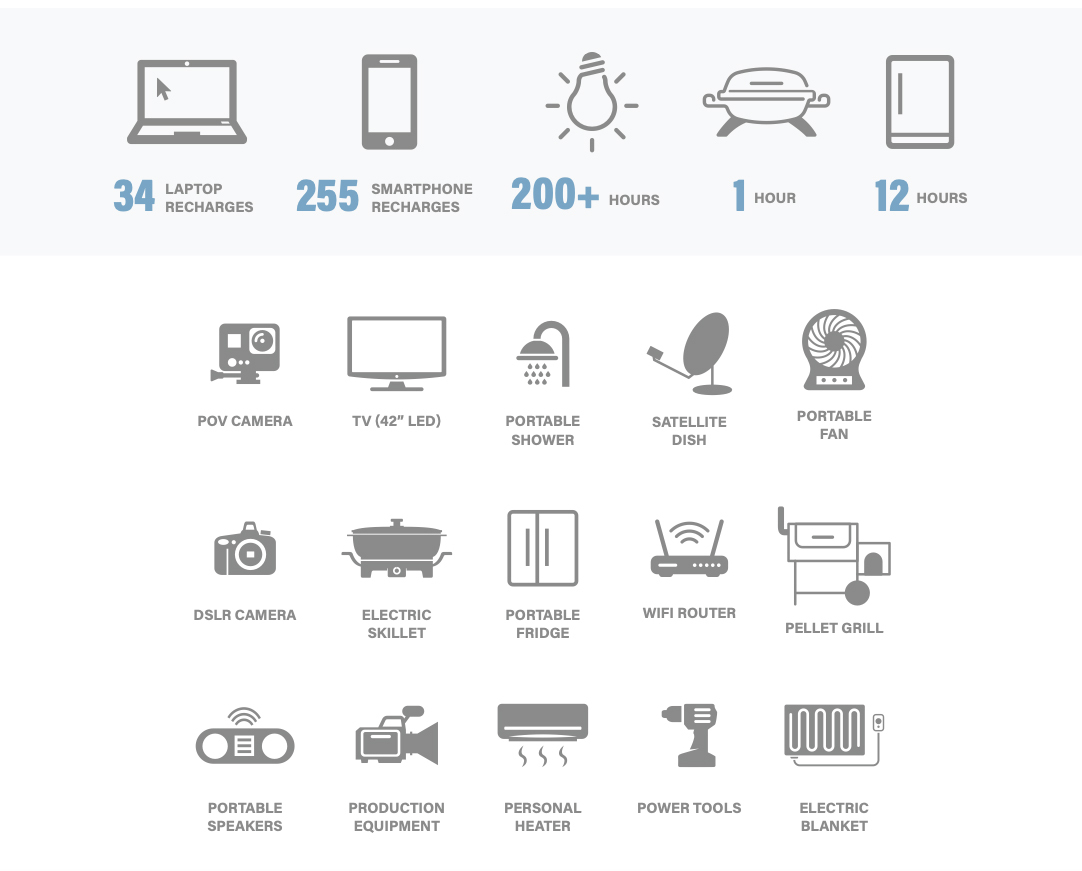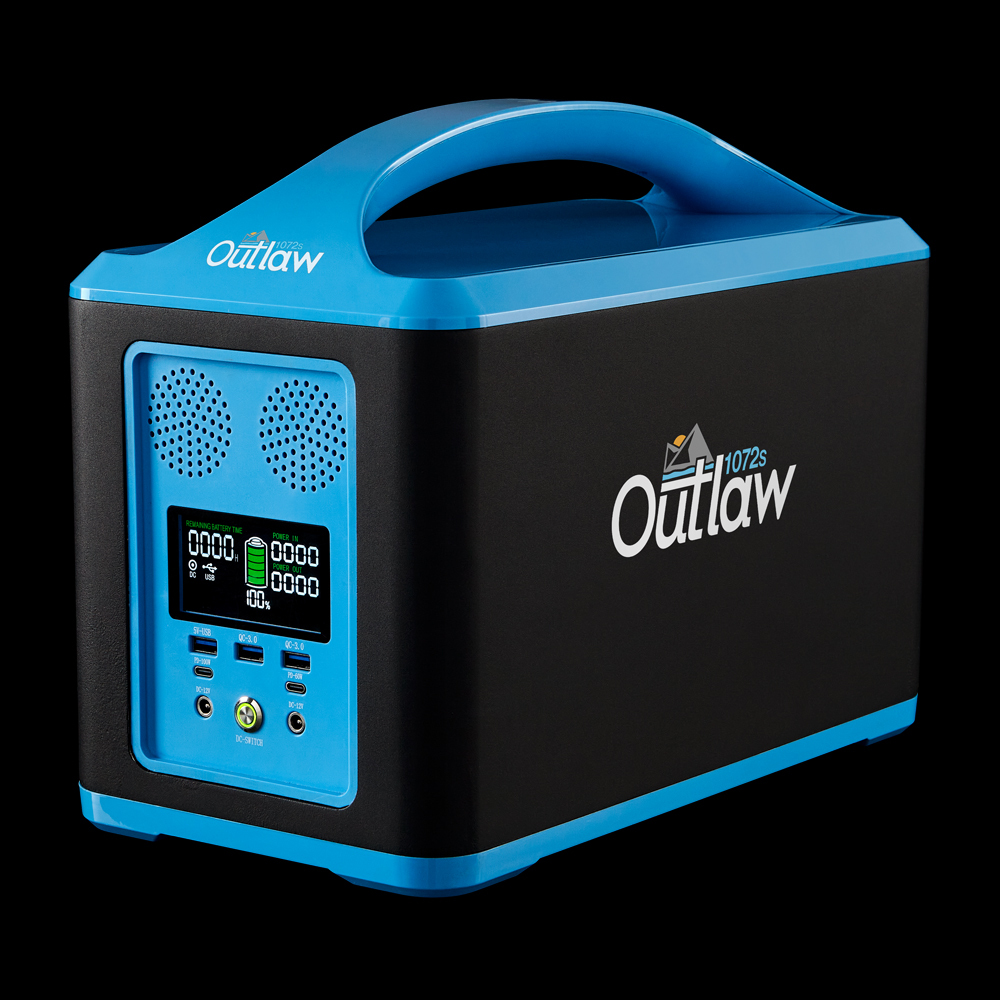Portable power station use is on the rise, and they are now being used for more than just hobbies like camping. People are increasingly keeping portable power stations on hand because of unpredictable weather patterns and to be ready for emergency situations. A portable power station offers security and peace of mind in a variety of scenarios, from storms knocking out power to boondocking and boating trips.
What is a Portable Power Station?
As energy-dense lithium battery technology has advanced over the last 10 years, portable power stations have emerged as a useful solution for off-grid power. A portable power station is an easily transportable lithium battery that combines a built-in battery gauge, an inverter with an AC outlet, and multiple DC outlets to provide power for common devices while you’re off the grid.
All electronic devices use either AC or DC electricity. Alternating current (AC) is the more commonly recognized type of electricity. Most household appliances, including air conditioning, microwaves, refrigerators, and hair dryers, run off AC. Less commonly recognized than AC, direct current (DC) is used in devices that have a battery as their power source. These include cell phones, laptops, portable speakers, and cameras.
If you were to purchase a battery by itself it would not be useful to power all your devices. Power stations are useful because they merge an inverter to power AC devices (standard two or three-prong US wall socket type) with different connectors to power DC devices all in one unit. Some familiar DC outlet types include USB-A, USB-C, barrel jacks, and 12V car power sockets (also known as cigarette lighter sockets). Good portable power stations include not only a standard charger that plugs into the wall at home, and a 12V car port charger, but also will allow for charging from a solar panel. In addition to offering versatile power, a portable power station also provides fast charge times with interactive screens that make tracking and managing your power easier.
What Are The Advantages of Having A Portable Power Station?

Whether you need power when camping, fishing, tailgating, on the job site, or in an emergency, a portable power station can provide electricity when and where you need it. When looking at the advantages of a portable power station, a comparison must be made to their alternative, which is a fossil fuel generator. Although generators provide an endless amount of power as long as you have the fuel, they are noisy, emit dangerous greenhouse gases (carbon monoxide and carbon dioxide), and require regular running and maintenance, including oil changes, cleaning air filters and spark arrestors, and potentially cleaning out the carburetor when it gets clogged by dirty fuel. In fact, each year, over 50,000 people visit the emergency room for accidental carbon monoxide poisoning.
Conversely, portable power stations do not require any maintenance besides discharging and recharging at least once every six months. They are silent and can be used indoors without fear of asphyxia. Despite their finite capacity, their capacity limitations can be overcome by planning for and purchasing a power station with enough watt hours in reserve to get you through your intended adventure and/or supplementing capacity with a solar panel.
There are a lot of different terms that are used and often conflated to reference energy systems that can provide easily transportable, off-grid energy and power multiple devices. For example, power banks are similar to portable power stations. The main difference between these two is that a power bank tends to be smaller in size and more lightweight, but also has a reduced battery capacity and therefore is unable to store greater amounts of energy.
When it comes to comparing a portable power station to a solar generator, there is actually not a huge difference. Both solar generators and portable power stations can be charged by solar power as well as store this energy to be used at a time of your choosing. The main difference between the two is that a portable power station can be charged by sources other than solar panels, such as from wall outlets that are powered by the grid.
Depending on the continuous watt rating and capacity, a portable power station can be used to power almost any device for as long as you want. You can calculate your power needs, size your battery bank and determine your solar requirements here.

Why Choose a Portable Power Station:
lithium battery-based portable power station provides a more streamlined and manageable solution for your energy needs with added advantages over fossil fuel-based generators, including:
- Able to be used indoors
- Functions much more quietly
- Requires far less upkeep
- Can be connected to solar panels
What you will use the portable power station for, and what you need from it, will determine the best one for you. Some important specifications to look for when selecting your portable power station are:
- Capacity: This refers to how much energy the battery is able to store. The higher capacity stations are best used for larger needs that demand a lot of energy for long-term use scenarios (e.g., home backup power), while smaller capacity stations are best used for situations such as charging your phone while car camping. When picking the right battery for your needs, you should determine what level of capacity you really need first and foremost.
- Portability: While the name portable power station naturally means a small item that can be moved around easily, the term is also relative to what you are using it for and how much energy you need. Knowing your energy needs can help you balance your needs with the best portable power station for you. If you, for example, need to power multiple small items like laptops and phones, you will likely need a smaller power station with less energy capabilities as opposed to needing to power multiple large items for an extended period of time.
- Solar Charging: A portable power station should be able to rely on solar energy as well as outlets powered by utilities. Solar energy helps to expand your powering options and is incredibly useful for those who are out on a boat, in a van or on a campsite for an extended period of time.

RELiON 1000W Portable Power Station
We currently offer the Outlaw® 1072S, which is a 1000-watt continuous 2000-watt peak, 921-watt hour portable power supply, which is capable of charging through a solar panel (150-watt max). The Outlaw is powered by LiFePO4 cells capable of 2,000 lifetime cycles at 80% depth of discharge with proper care. The Outlaw is a portable power station that puts natural power right at the tips of your fingers. The Outlaw can power the essentials while off-the-grid or work as reliable backup power when things go dark. From personal electronics to TVs and refrigerators, it's strong enough to power what’s needed, when it’s needed, and lightweight enough to take anywhere! Have power on hand without the noise and fumes of a gas generator.
Multiple output ports mean you can plug almost any device into it. It features 4 AC, USB 2.0, USB-C, a 9V barrel jack, a 12V cigarette lighter car plug, and an EC5 30amp DC port. It also features an LCD screen that displays watts in/out and remaining runtime.
If you need help calculating energy usage or have any questions about the Outlaw, please contact a RELiON Battery specialist.
